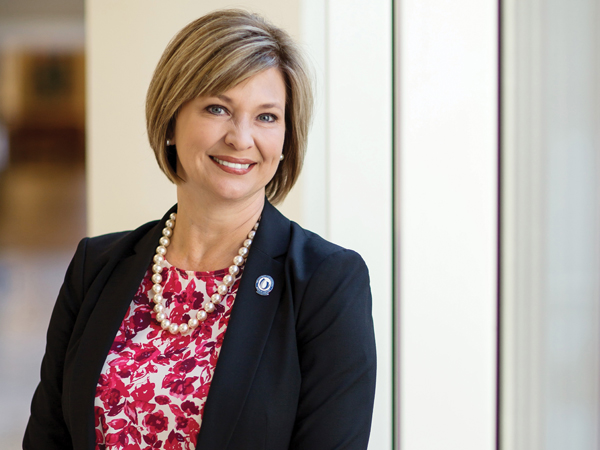Woodward wields national influence as accreditation chief

Dr. LouAnn Woodward's role in medical education will continue to resonate beyond UMMC as she leads the nation's authoritative accrediting body during a health care crossroads.
For a one-year term that begins July 1, Woodward will officially take over as chair of the Liaison Committee on Medical Education, which sets standards for U.S.- and Canadian-chartered medical education programs run by universities or medical schools.
Having led UMMC since March 1, 2015 as vice chancellor for health affairs and dean of the School of Medicine, Woodward has served simultaneously as chair-elect of the LCME for the past year after being confirmed unanimously by its board.
Since 2013, she has worked on the executive committee and as chair of the subcommittee on International Relations for the LCME, which is sponsored by the Association of American Medical Colleges and the American Medical Association.
“I am honored to serve at a time when overall national changes to heath care and health care delivery are in full swing,” Woodward said. “We want to try and mitigate the impact on medical education and on students.
“There are a few things we always worry about. Right now, student debt load is becoming a concern as schools become more financially strained and they look to students to help cover those shortfalls; we want to protect against that as much as we can.
“Also, we continue to pay attention to the way students interface with electronic health records; it's a balance between training them on the use of EHRs and keeping the EHR from distracting from their learning and clinical experiences.”
Her term arrives at a time of recent changes to the AAMC-sponsored Medical College Admission Test; recruitment of a diverse student body; an emphasis on self-study; efforts to promote interprofessional education; the rise of population health as a study topic; heightened instruction on such themes as geriatrics, pain management, palliative care, disease prevention, addiction, social determinants of health, and much more.
During the 12 months that Woodward served as LCME's chair-elect, about a dozen medical schools were added to the AAMC's membership, for a total of 147 accredited U.S. institutions.
The AAMC's members include 17 accredited Canadian medical schools; around 400 major teaching hospitals and health systems, including 51 Department of Veterans Affairs medical centers; and more than 80 academic societies.
Since 2002, first-year enrollment at the U.S. schools has ballooned by 28 percent, the AAMC reports, for a total of 21,030 students for 2016-2017; 22 schools have been created and accredited since that year.
As LCME chair, Woodward's reach will extend beyond the United States: She will represent the organization as a voting member of the Council for Accreditation of Canadian Medical Schools, which sanctions M.D. programs in Canada, in cooperation with the LCME.
“While I am chair, I'll still be functioning as a member of the LCME, doing site visits and reviews, but also as chair, organizing and helping determine the direction of meetings," Woodward said.
“I believe my role as chair, beyond all of that, is to help guide the LCME in shaping the strategic direction of medical education, making sure it is relevant and continues to realize positive changes.”
Most state boards of licensure require that medical schools earn LCME accreditation, indicating that they meet national standards for the awarding of a medical degree.
Accreditation usually occurs every eight years and covers standards in five areas: institutional setting, educational programs for the M.D. degree, medical students, faculty and educational resources.
An institution must be accredited by the LCME in order to receive federal grants for medical education and participate in federal loan programs.
In 2012, Woodward helped steer the School of Medicine through its accreditation process. After weighing the school's performance for around 130 measures, the LCME reported that the education program complied in every area, a rare occurrence for any medical school.
“As vice chancellor for health affairs, Dr. Woodward is ideally suited to lead the LCME as it adapts to meet many challenges,” said LCME board member Dr. Roger Hadley, dean of the Loma Linda University School of Medicine in California and executive vice president for medical affairs and chief medical officer for Loma Linda University Health.
“Economic demands and unprecedented advancements in technology will force many changes in the role of medical doctors.”
A native of Carroll County in Mississippi, Woodward is also a professor of emergency medicine. She earned her undergraduate degree from Mississippi State University and, in 1991, her M.D. at the University of Mississippi School of Medicine in Jackson, where she also completed her residency training.
For several years, she was associate vice chancellor for health affairs and vice dean of the medical school under her predecessor, Dr. James Keeton.
Dr. John Fogarty, who served as LCME chair for the 2015-2016 academic year, said that in the four years since Woodward was selected to be a member of the organization, “she has been a tireless contributor and dedicated professional.
“Dr. Woodward is a highly knowledgeable and experienced LCME member, and it was a delight to work with her,” said Fogarty, dean of the Florida State University College of Medicine in Tallahassee, who just completed six years on the LCME.
“I am confident that the LCME is in great hands under Dr. Woodward's excellent leadership.”


